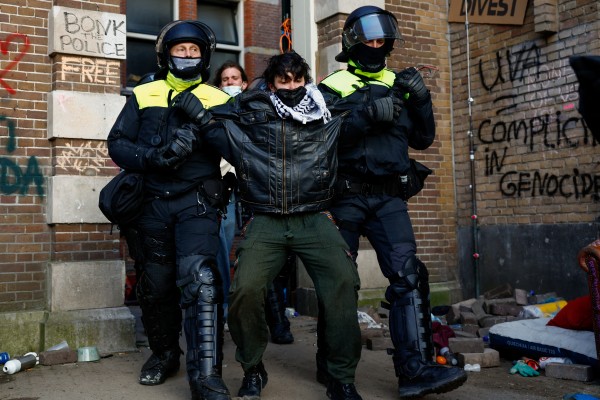AMSTERDAM/WASHINGTON: Dutch riot police clashed with barricaded protesters at the University of Amsterdam on Wednesday, while police in several U.S. cities arrested scores of demonstrators and dismantled encampments overnight at universities, as student-led protests against Israel’s war in Gaza continued roiling campuses across both continents.
In Amsterdam, protesters atop makeshift barriers of desks, fences, bricks and wooden pallets aimed fire extinguishers at police, local television showed. Officers struck protesters with batons and knocked down the barricades within minutes, dragging many people away as hundreds of others shouted “Shame on you!”
At George Washington University in Washington, D.C., the Metropolitan Police Department said it had arrested 33 people, including some for allegedly assaulting a police officer. Video showed officers took down tents and deployed pepper spray and cleared demonstrators from campus and the surrounding streets, a few blocks away from the White House.
Police Chief Pamela Smith said at a news conference that authorities had seen “an escalation in the volatility of the protests” over the last few days, prompting police and the university to make the decision to remove the encampment.
Smith and Mayor Muriel Bowser had been scheduled to testify to Congress later on Wednesday about why they had previously declined to clear the encampment, but the hearing was cancelled after the police raid.
At the University of Massachusetts in Amherst, police arrested more than 130 people and removed an encampment after the school’s chancellor, Javier Reyes, said he had summoned police “as a last resort.”
“This is not the outcome we had hoped for,” he added.
The state chapter of the American Civil Liberties Union criticized the move, saying “calling heavily armed police on student political expression is an inherently dangerous choice.”
The school’s Students for Justice in Palestine group posted video showing protesters thrown to the ground and faculty members among those arrested.
The New School faculty establish ‘solidarity encampment’, reportedly the first faulty camp amid series of ongoing pro Palestine student led protests at Universities around the country.
The newly established camp is a direct response to last week’s arrests of over 40 student… pic.twitter.com/JmZ4BCTYU9
— FreedomNews.Tv FNTV (@FreedomNTV) May 8, 2024
In New York, police arrested dozens of demonstrators at the Fashion Institute of Technology, according to video posted on social media.
Israel’s retaliatory campaign in Gaza has killed nearly 35,000 Palestinians, according to Gazan authorities, and triggered a catastrophic humanitarian crisis and famine threatening the enclave’s 2.5 million residents.
The war began when the militant group Hamas attacked Israel on Oct. 7, killing 1,200 people and taking more than 250 hostage, according to Israeli tallies.
Students at universities throughout Europe have staged sit-ins and other actions influenced by weeks of larger-scale disturbances at U.S. universities.
The protesters have called on schools to cut financial ties with companies they say are profiting from the oppression of Palestinians.
In Amsterdam, UvA management said on Monday it had exchange programmes with three universities in Israel, which are halted because of security concerns, and was cooperating with Israeli scientists or companies in eight different European research projects.
Amsterdam: Palestine activists push police off campus
A group of pro-Palestine students at the University of Amsterdam forced police back off campus the day after officers bulldozed their Gaza solidarity camp and attacked students.
The students created a Palestine camp on the… pic.twitter.com/JrJoT9FxtI
— Middle East Monitor (@MiddleEastMnt) May 8, 2024
It said none of those partnerships were in support of military goals; it did not mention the Israeli-occupied Palestinian territories.
On Tuesday, police dispersed protests at the Swiss University of Zurich and at the courtyard of the Freie Universitaet Berlin.
Last week, police took similar action at the Sorbonne University in Paris, while on Wednesday the Brussels University said it would file a police complaint against students who were allegedly involved in a violent protest, including an assault on the Jewish students union leader.
In a response to protesters, Ireland’s Trinity College Dublin (TCD) said this week that it would pull investments from Israeli companies linked to settlements in the occupied Palestinian territory, following a student protest over the war in Gaza.
(REUTERS)
In a career spanning three decades and counting, Ramananda (Ram to his friends) has been the foreign editor of The Telegraph, Outlook Magazine and the New Indian Express. He helped set up rediff.com’s editorial operations in San Jose and New York, helmed sify.com, and was the founder editor of India.com.
His work has featured in national and international publications like the Al Jazeera Centre for Studies, Global Times and Ashahi Shimbun. But his one constant over all these years, he says, has been the attempt to understand rising India’s place in the world.
He can rustle up a mean salad, his oil-less pepper chicken is to die for, and all it takes is some beer and rhythm and blues to rock his soul.
Talk to him about foreign and strategic affairs, media, South Asia, China, and of course India.





